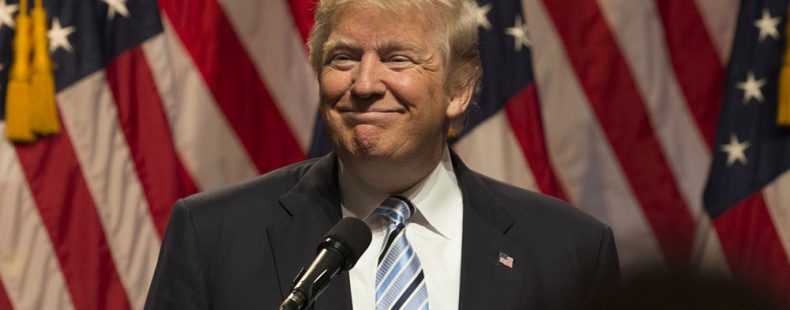Donald Trump took the oath of office on Friday, January 20, 2017 and officially became the 45th President of the United States of America. Everyone has an opinion on the word choices and speaking styles of politicians, and speeches from world leaders often cause words to spike in lookups on Dictionary.com.
Inauguration and inaugurate (to induct into office with formal ceremonies; to install) were the top lookups throughout the morning, and chorale made it into the top ten as the Missouri State University Chorale was performing. Bigly—of course—also made appearances on our lists as the day continued.
But what words were people looking up while President Trump was at the podium? We’ve highlighted a few of the top lookups, along with the quote from Trump’s speech that likely caused the spike.
Reap
“For too long, a small group in our nation’s capital has reaped the rewards of government while the people have borne the cost.”Reap is a very old word, going all the way back to before 900. While the first definition is directly tied to farming, the meaning “to get as a return, recompense, or result: ‘to reap large profits'” is a common and more figurative way of using the term.
Bore (Borne)
While bore appeared in our lookups, transcripts of the speech suggest that Trump said, or at least meant, “borne,” not “bore,” in the quote mentioned above.Borne is the past participle of bear, which is an extremely flexible word, with over 30 variances in meaning. Putting aside the big animal (or small toy), bear can also mean “to hold up; support,” “to press or push against,” or, in what we believe to be President Trump’s reflection, “to suffer; endure; undergo.”
Carnage
“But for too many of our citizens, a different reality exists […] the crime and the gangs and the drugs that have stolen too many lives and robbed our country of so much unrealized potential. This American carnage stops right here and stops right now.”A dramatic word, carnage means “the slaughter of a great number of people, as in battle; butchery; massacre.” Carnage entered English in the late 1500s from Middle French, from the Italian carnaggio, which in turn is from Medieval Latin carnaticum meaning “payment or offering in meat.”
Redistribute
“The wealth of our middle class has been ripped from their homes and then redistributed all across the world.”Redistribute is a verb that indicates the sharing of an object (in this quote, the object is “wealth”). To redistribute is “to distribute again or anew” or “to alter the distribution of; to apportion differently.” It seems like it often means both of those definitions at once. The word itself doesn’t represent a quality, or a method—it’s safe to assume that different administrations have very different intentions when it comes to redistribution of wealth.
Ravages
“We must protect our borders from the ravages of other countries making our products, stealing our companies and destroying our jobs.”Only some English speakers are likely to know and understand this word, although it’s much easier to figure out in context. In this case, we’re looking at the third definition of ravage: “havoc; ruinous damage: ‘the ravages of war.'”
Eradicate
“We will reinforce old alliances and form new ones and unite the civilized world against radical Islamic terrorism, which we will eradicate from the face of the Earth.”The literal definition of eradicate is “to remove or destroy utterly; extirpate.” Eradicate is an especially strong word, and it’s noteworthy that President Trump chose to highlight radical Islamic terrorism specifically, instead of saying he would unite the world to eradicate all terrorism.
Prejudice
“When you open your heart to patriotism, there is no room for prejudice.”This word remained in our top searches for quite awhile, which makes sense, especially in light of peoples’ interest in the word “eradicate.” While the first listed definition of prejudice is “an unfavorable opinion or feeling formed beforehand or without knowledge, thought, or reason,” it can be also used in the context of “unreasonable feelings, opinions, or attitudes, especially of a hostile nature, regarding an ethnic, racial, social, or religious group.”
Solidarity
“We must speak our minds openly, debate our disagreements honestly, but always pursue solidarity.”Solidarity means a “union or fellowship arising from common responsibilities and interests, as between members of a group or between classes, peoples, etc,” or a “community of responsibilities and interests.” This word also spiked during several speeches of the previous administration.
President Trump’s words will continue to draw eyes and lookups as his term continues, and it will be interesting to see whether, since these words were chosen and written by President Trump himself, we can expect more of the same.














